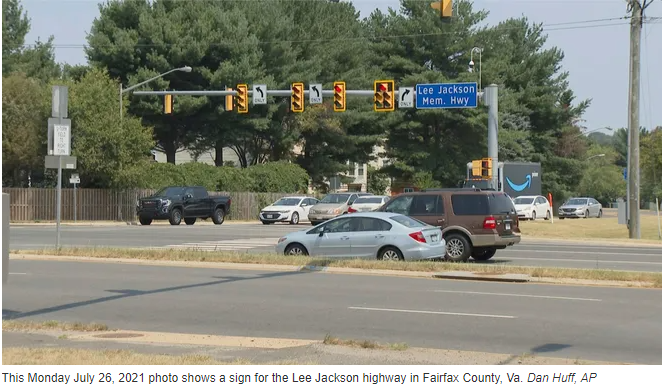VIRGINIA: County Commission Contends With Confederate Side Street Names
McLEAN, Va.— It came as a surprise to Mottrom Drive resident Beau Fitzpatrick that he lives on a street named for a Confederate soldier.
“Really? I always assumed it was named for an apple, or apple juice,” he said, referring to the Mott’s brand of apple products.
In fact the street in McLean, Virginia, not far from the nation’s capital, is named for Mottrom Dulany Ball, a captain in the Fairfax cavalry who was among the first Confederate officers taken prisoner in the Civil War. He became a Republican after the war and later a founding father of Alaska.
Mottrom Drive is among scores of side streets identified last year by a Fairfax County commission tasked with ferreting out forgotten names of the Confederacy. Northern Virginia, which saw some of the biggest battles of the Civil War and for decades was an indisputable part of the South, is now one of the wealthiest regions in the country with waning ties to its Southern roots.
As such, it has been swifter than other spots in the South to rid itself of Confederate names and memorials that dominated the region. A database maintained by the Southern Poverty Law Center shows nearly 2,300 roads, schools and monuments linked to the Confederacy spread across 23 states. In recent years, fewer than 400 have been removed or renamed.
In northern Virginia, the trend began in 2017, several years before the most recent wave of name changes. Fairfax County’s former J.E.B. Stuart High School — named after the Confederate general — is now called Justice High.
Fairfax and Loudoun counties are also continuing to pursue changes for names of major highways running through their territory. In Fairfax, the effort is focused on Lee Highway and on Lee-Jackson Highway, which are named for generals Robert E. Lee and Stonewall Jackson. Loudoun County solicited the public for new names for John Mosby Highway, named for a Confederate cavalry commander who conducted raids throughout northern Virginia, as well as Harry Byrd Highway, named after a 20th century politician who led the state’s massive resistance campaign against federal demands to desegregate public schools.
But the counties are taking a different approach to the many side streets in the region that also carry Confederate names, both well known and long forgotten.
Fairfax is leaving it up to residents to seek a name change on those streets identified by its history commission. So far, not a single street has come forward with a petition to do so.
Jeff McKay, chairman of the Fairfax County Board of Supervisors, said he doesn’t see the inaction as an endorsement of the Confederacy.
“We’ve raised awareness about where these streets are, and we’re leaving it up to the petition process” to allow those who are motivated to press for a change, he said.
He said he suspects a majority of county residents oppose naming streets for members of the Confederacy, but that doesn’t necessarily translate into wanting to change your own street name. He acknowledged it’s a hassle to do so, requiring changing the plats on file with the county and a whole host of address-change notifications a resident must make to all the banks, businesses and utilities with whom they conduct their daily affairs.
Neighboring Loudoun County, meanwhile, is not leaving the decision up to its residents. County staffers in Loudoun identified a smaller number of side streets, fewer than a dozen, that are linked to the Confederacy.
A formal vote on whether to change the names is scheduled for September, but at a meeting this month, a majority of board members made it clear they intend to change all of the names. Indeed, they sent county staff back to find out how much it would cost to do even deeper research to identify even more streets that might possibly carry a Confederate or segregationist connection that has thus far gone undetected.
Koran Saines, a county supervisor who supports the name changes, said the issue is a simple one.
“You’re a part of the Confederacy, you should not be recognized with the honor of a street name. I’m sorry to tell you that. If the Confederacy had their way, three of us would not be sitting here,” said Saines, one of three African Americans on the board of supervisors, at a July 6 meeting.
On Early Avenue in western Loudoun County, longtime resident Bertie Jones is unhappy with the change.
“I think it’s a crock of bull,” said Jones, who has lived on the street since 1965.
Jones said she knows that her street is named for Confederate Gen. Jubal Early, who led a campaign through Union territory in 1864, demanding ransoms from towns to avoid setting them ablaze and menacing the nation’s capital. But she’s not particularly bothered by it.
“Does this mean that everyone with the last name Early is going to have to change their name? It just makes more division than anything,” she said.



